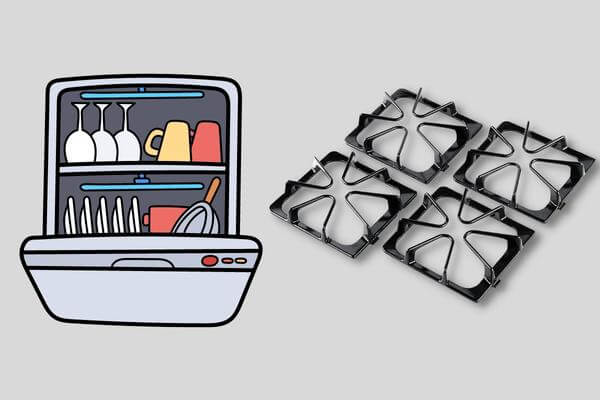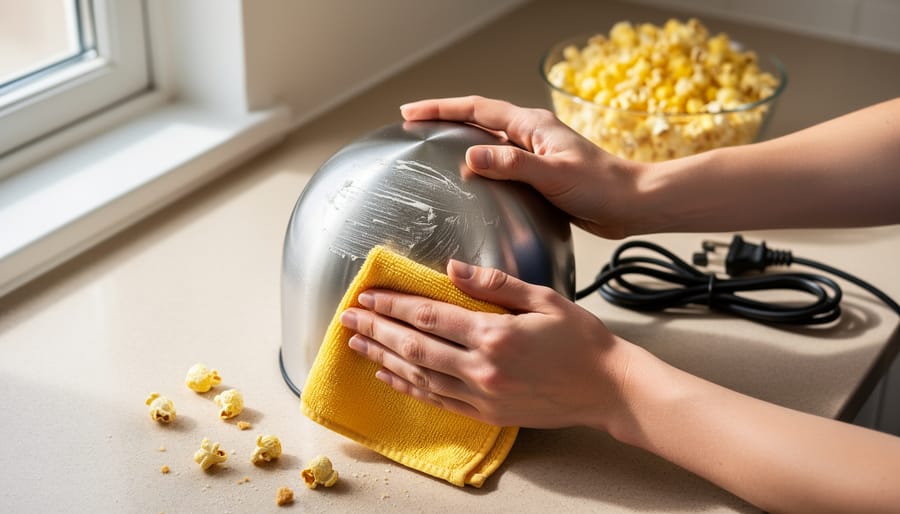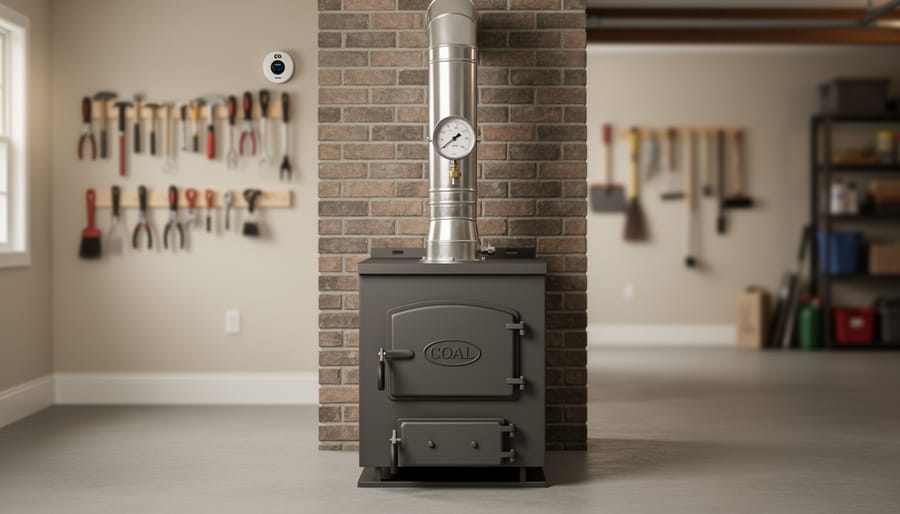Cleaning gas stove grates can be tedious and time-consuming, but using a dishwasher to clean them can provide a more convenient and efficient solution.
While cleaning gas stove grates in a dishwasher has its benefits, such as saving time and providing a more thorough clean, it also has potential drawbacks, such as the risk of damage to the grates or the dishwasher itself.
Therefore, it is essential to determine if your gas stove grates are dishwasher-safe before attempting to clean them in this manner.
In this article, we will explore the pros and cons of cleaning gas stove grates in a dishwasher, guide how to determine if your grates are safe, and offer step-by-step instructions for cleaning them in a dishwasher.
We will also discuss alternative methods for cleaning gas stove grates if you prefer to use something other than a dishwasher.
This article aims to provide comprehensive information to help you make an informed decision on cleaning your gas stove grates effectively and efficiently.
The Pros of Cleaning Gas Stove Grates in a Dishwasher
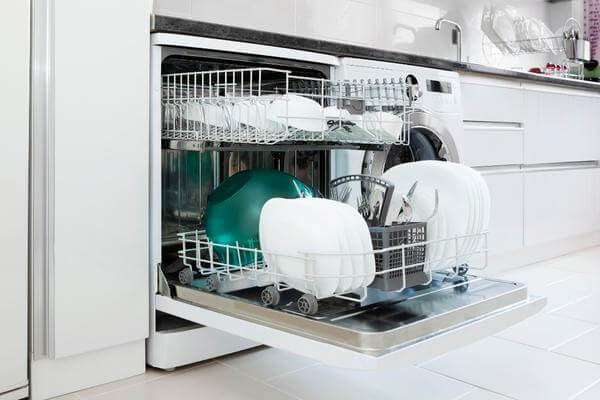
Increased convenience and time-saving
One of the most enormous benefits of cleaning gas stove grates in a dishwasher is increased convenience and time-saving. Cleaning gas stove grates manually can be a time-consuming and strenuous task, especially if they have built up grease and stains.
Putting the grates in the dishwasher can free up your time and energy to focus on other tasks. The dishwasher will clean the grates thoroughly and effectively, leaving them looking as good as new.
More thorough cleaning than manual scrubbing
Another advantage of cleaning gas stove grates in a dishwasher is that it provides a more thorough cleaning than manual scrubbing.
A dishwasher’s high-powered jets of water and detergent can effectively clean even the most stubborn grime and grease buildup, removing tough stains that manual scrubbing may miss.
The dishwasher’s cleaning cycle can also reach areas of the grates that are difficult to clean manually, ensuring a more complete and adequately clean.
Potential to remove tough stains and buildup
Cleaning gas stove grates in a dishwasher have the potential to remove tough stains and buildup that manual scrubbing may not be able to handle.
The dishwasher’s hot water, steam, and detergent can penetrate even the toughest grime and grease, making the grates look new.
Additionally, you can use specialized dishwasher cleaners to tackle tough stains, providing an even more effective clean.
By cleaning gas stove grates in a dishwasher, you can restore them to their original condition and ensure that they continue to function effectively.
The Cons of Cleaning Gas Stove Grates in a Dishwasher
Risk of damage to the grates if they are not dishwasher safe
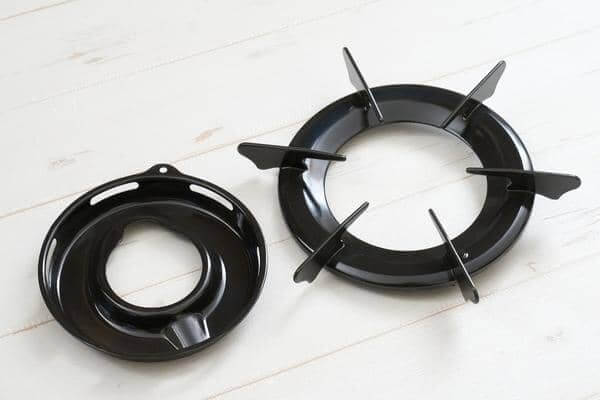
While cleaning gas stove grates in a dishwasher can be convenient and practical, it also carries the risk of damage to the grates if they are not dishwasher safe.
Some gas stove grates may be made of materials that are not suitable for the dishwasher, such as cast iron, which can rust or become discoloured in the high heat and steam of the dishwasher.
Before cleaning gas stove grates in a dishwasher, it is essential to check the manufacturer’s instructions to ensure they are dishwasher-safe.
Risk of damage to the dishwasher if the grates are too large or heavy
Another potential drawback of cleaning gas stove grates in a dishwasher is the risk of damage if the grates are too large or heavy.
Some gas stove grates may be too large or heavy to fit comfortably in a standard dishwasher, and their weight can put undue stress on the dishwasher’s arms and other parts, potentially causing damage.
Before cleaning gas stove grates in a dishwasher, it’s essential to ensure that they will fit comfortably and not cause damage to the dishwasher.
Risk of scratching or discolouration of grates if they are not cleaned properly
Finally, there is a risk of scratching or discolouration of the grates if they are not appropriately cleaned in the dishwasher.
The high heat and steam of the dishwasher, combined with the harsh detergents used, can cause discolouration or scratching if the grates are not properly protected or cleaned.
To minimize these risks, it’s important to follow the manufacturer’s cleaning instructions and use a gentle cycle and mild detergent.
Additionally, using a dishwasher-specific cleaner can help to avoid discolouration and keep the grates looking their best.
How to Determine if Your Gas Stove Grates are Dishwasher-Safe?
Determining whether your gas stove grates are dishwasher safe is an important step in ensuring that they will not be damaged during the cleaning process. The following are some steps you can take to determine if your gas stove grates are dishwasher safe:
Check the manufacturer’s instructions for cleaning recommendations.
This is the most reliable source of information on whether your gas stove grates are dishwasher safe. The manufacturer’s instructions will also guide how to clean the grates in a dishwasher, including the recommended detergents and cycles.
Look for a “dishwasher safe” label on the grates.
Many gas stove grates will have a label indicating dishwasher safety. If you cannot find this information in the manufacturer’s instructions, checking for a label on the grates is a good alternative.
Consider the material the grates are made of.
The material the grates are made of can also provide insight into whether they are dishwasher safe.
For example, cast iron grates are typically not dishwasher safe, while porcelain-coated steel grates are generally safe to clean in a dishwasher.
Knowing the material, the grates are made of can help you decide whether they are safe to clean in a dishwasher.
How to Clean Gas Stove Grates in a Dishwasher?
Here is a step-by-step process for cleaning gas stove grates in a dishwasher:
- Remove grates from the stove: First, ensure they are cool to the touch, then remove them from the stove.
- Scrape off any loose debris: Using a plastic scraper, gently remove any loose debris from the grates. Do not use a metal scraper, as this can scratch the surface of the grates.
- Wash grates in warm soapy water: Fill a sink with warm water and a small amount of dish soap. Place the grates in the water and let them soak for 10-15 minutes.
- Rinse grates: After soaking them, rinse them thoroughly with warm water to remove any soap residue.
- Load grates into the dishwasher: Place them in the dishwasher, ensuring they are securely and evenly positioned so they do not tilt or tip over during the wash cycle.
- Run dishwasher: Start the dishwasher on a normal cycle with hot water.
- Dry grates: After the dishwasher cycle is complete, remove them and dry them thoroughly with a clean cloth or paper towel.
- Reinstall grates on the stove: Once the grates are completely dry, reinstall them on the stove.
Before cleaning the grates, it’s essential to check the manufacturer’s instructions to make sure they are dishwasher safe. Some grates may not be suitable for dishwasher cleaning and may need to be cleaned by hand.
Alternatives to Cleaning Gas Stove Grates in a Dishwasher
Here are alternative methods for cleaning gas stove grates:
- Soak and Scrub: Fill a sink or large plastic bin with warm water and a small amount of dish soap. Place the grates in the water and let them soak for 10-15 minutes. Then, using a scrub brush or sponge, scrub the grates to remove any stubborn grime or grease. Rinse thoroughly with warm water and dry with a clean cloth or paper towel.
- Baking soda and vinegar: Sprinkle baking soda on both sides of the grates, then spray with white vinegar. Let the mixture sit for 10-15 minutes, then scrub with a scrub brush or sponge. Rinse thoroughly with warm water and dry with a clean cloth or paper towel.
- Ammonia Soak: Fill a large plastic bag with 1 cup of ammonia and enough warm water to cover the grates. Place the grates in the bag, seal it, and let it sit overnight. The next day, remove the grates and rinse them thoroughly with warm water. Dry with a clean cloth or paper towels.
- Self-Cleaning Oven Function: Some gas stoves come with a self-cleaning oven function. This can be used to clean the grates by placing them in the oven and running the self-cleaning cycle. Be sure to check the manufacturer’s instructions for specific instructions.
- Cast Iron Cleaner: If the grates are made of cast iron, you can use a cast iron cleaner to remove stubborn grime and buildup. Apply the cleaner to the grates, let it sit for the recommended time, and then scrub with a scrub brush or sponge. Rinse thoroughly with warm water and dry with a clean cloth or paper towel.
Before cleaning the grates, it’s essential to check the manufacturer’s instructions for recommended cleaning methods and ensure specific cleaning methods do not damage the grates.
More Gas stove maintenance and care Guides:
Bottomline
Cleaning the gas stove grate is necessary for maintaining your stove’s appearance and performance.
Cleaning the grates in a dishwasher can be a convenient and practical option, but it is vital to ensure the grates are dishwasher safe and clean them properly to avoid damage.
If using a dishwasher is not an option, alternative methods such as soaking and scrubbing, baking soda and vinegar, an ammonia soak, the self-cleaning oven function, and a cast iron cleaner can be used also effectively clean the grates.
No matter which method you choose, it is important to check the manufacturer’s instructions and clean the grates regularly to keep them looking and functioning like new.
Frequently Asked Questions
Can all gas stove grates be cleaned in a dishwasher?
Not all gas stove grates are dishwasher safe, so it’s essential to check the manufacturer’s instructions or specifications before putting them in the dishwasher.
How should I prepare the grates for cleaning in a dishwasher?
Before cleaning, it’s recommended to remove any loose debris or food particles and rinse the grates with hot water. Some grates may also need to be rubbed with a soft cloth or sponge to remove stubborn grease or residue.
Can cleaning gas stove grates in a dishwasher damage them?
If the grates are not dishwasher safe or are not cleaned properly, cleaning them in a dishwasher can cause damage such as warping, discolouration, or rusting. It’s essential to follow the manufacturer’s instructions carefully.
What are some alternative methods for cleaning gas stove grates?
Other methods for cleaning gas stove grates include:
- Hand-washing with hot soapy water.
- Using baking soda and water paste.
- Scrubbing with a scouring pad or steel wool.
How often should I clean my gas stove grates?
The frequency of cleaning depends on how frequently you use your stove and the amount of food and grease buildup. It’s generally recommended to clean the grates once a month or as needed to maintain their appearance and prevent food residue buildup.

